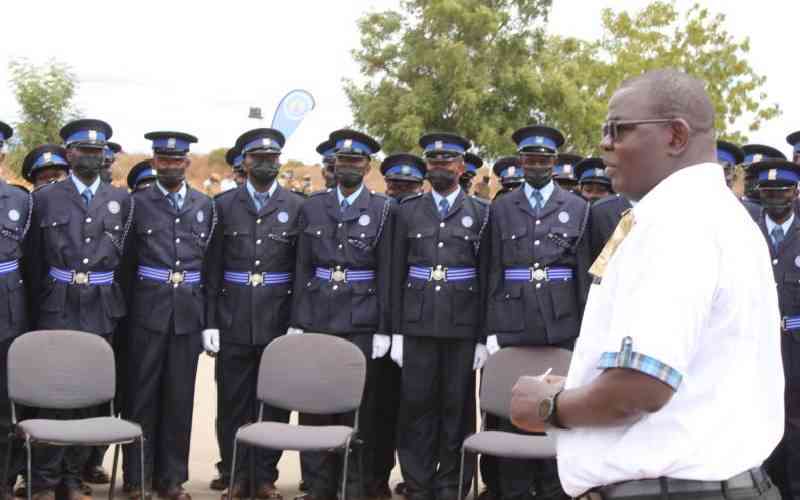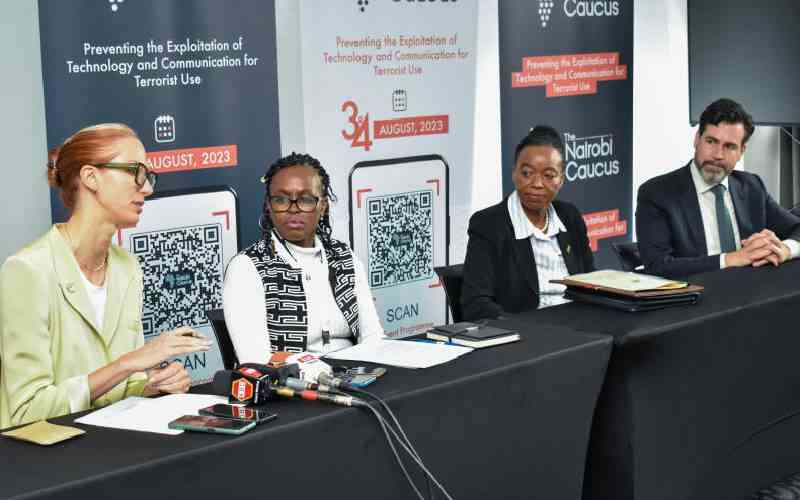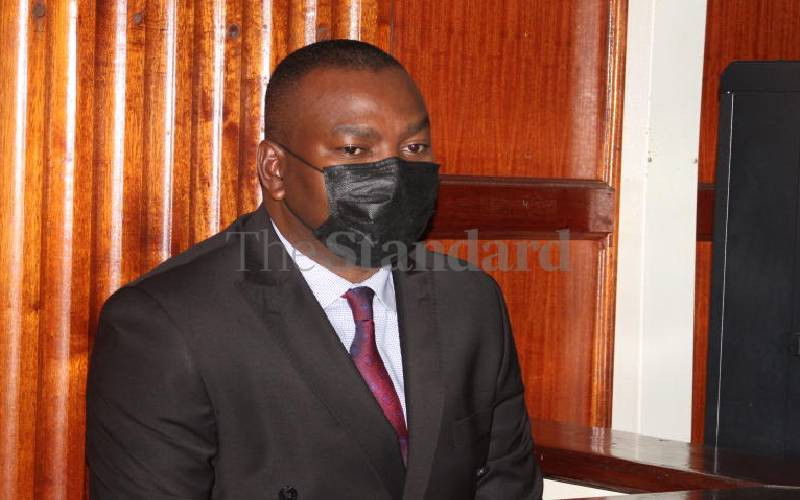 |
|
Security checks in Nairobi have hardly contained runaway insecurity. |
By DANIEL WESANGULA
NAIROBI, KENYA: As Government seeks to assure Kenyans of their safety, a fundamental cause of the current state of insecurity within the country is being ignored.
According to economic and security experts, institutional corruption within immigration and security forces will be the major impediment and has been a major cause for the current state of affairs.
A previous investigation by The Standard on Sunday established that for the right price, well-connected Government employees will create a whole identity for an individual, evading whatever checks and measures put in place.
An ill-prepared, ill-paid, poorly motivated workforce is keen to look the other way for that extra shilling with little regard to the risk they put the country. For about Sh100,000, one can get a birth certificate, school leaving certificate, national identity card, certificate of good conduct, driving license as well as a Kenyan passport.
During the investigation, The Standard on Sunday created a fictitious character — Charles Njehia Kinuthia — whose photo was lifted from the Federal Bureau of Investigations (FBI) website of inmate Ahmed Khalfan Ghailani, serving a life sentence for his role in the 1998 twin United States Embassy bombings in Nairobi and Dar es Salaam. And in ten days he had five crucial identification documents. He had a birth certificate, certificate of good conduct, ID card, driving license and school-leaving certificate.
JAILED FOR LIFE
Before he was jailed for life in 2004 in the US, Ghailani spent years on the FBI’s Most Wanted List with a $5 million (Sh420 million) bounty on his head. A birth certificate obtained by our investigations team shows the Tanzania-born terrorist was born at Pumwani Maternity Hospital on April 25, 1991.
“It remains a hard truth that some of our public services are rife with waste and corruption. The corruption is endemic and systematic in all government institutions. A corruption so endemic that our ability to deal with normal problems has been compromised,” former anti-corruption chief John Githongo said.
Asman Kamama, the chair of the Parliamentary Committee on Security, believes that the blame lies squarely on the departments of Immigration and registration of persons.
“There is grand corruption in these two departments which continue to let down successive governments. There are junior officers within these offices who have made it their stock-in-trade to facilitate the acquisition of official Kenyan documents by foreigners,” Kamama said, as he apportioned blame to the police force as well.
“The corruption is systematic within the police force. We have received reports that even in an overt operation as immense as the Eastleigh one, some people who had been caught in the swoop secured their freedom after parting with money.”
Security analyst and lecturer at Egerton University Ng’etich Bitok says a growing tolerance level of corruption within government has left Kenyans exposed.
“We left things to get worse over the years. This is reactive to an issue that has not been dealt with. Some organs within the government have not earned their keep and operations such as the Eastleigh one do not address the underlying issues,” Ngetich said.
Economist Robert Shaw says repeated bribing and deal making in all arms of the government have turned into mere shells the institutions that Kenyans are supposed to have faith in. “How can we trust people who are meant to uphold our security and safety when we have seen them on numerous occasions in compromising situations . . . and we know for a fact that they are corrupt. It will take more than a raid to correct this. The link between corruption and insecurity is an obvious one...but with devastating results,” Shaw said.
Stay informed. Subscribe to our newsletter
In March, the police in Mombasa announced a ‘major win’ in the fight against terror after intercepting a vehicle loaded with explosives.
However, questions remain on how the explosives were mounted onto the vehicle and the movements of the car. Among the explanations given by security sources was that an FBI Communication Intelligence Unit had been tracking the car from a signal emitted by one of the suspects’ cell phone for weeks after intercepting their communication with designated Al Shabaab cell members in the Gedo region of Somalia when the suspects drove into Mandera through Garissa.
Some accounts suggest the car-borne improvised explosive device was partially assembled in Dadaab, Garissa. The Americans lost the cell phone signal when the car approached Mombasa and were trying to alert the Kenyan police about a suspicious car when they suddenly stumbled upon the bomb signal.
If the suspects made their way into the country from Somalia, through northern Kenya, and down to the coast, what were the border posts that they crossed through? And were they manned?
CORRUPT OFFICIALS
Measures put in place by the national government to keep harmful individuals at bay remain empty and of little consequence as corrupt government officials have mutated into merchants of identification documents.
Late last year, Interior Cabinet Secretary Joseph ole Lenku announced at a press conference that 15 senior immigration officers had been sacked over illegal issuance of identity documents to foreigners. In addition, as a precautionary measure, investigators were deployed to the Department of Immigration to help “avoid recurrence of security lapses like we have seen in the past,” Ole Lenku told the press then.
“The sacked officials rushed to court and an injunction against their dismissal was issued. They are currently drawing salaries but are not working. Nothing has moved so far,” the communications director at the Interior Ministry, Mr Mwenda Njoka, said last week.
Plus, Ng’etich says, the Kenyan justice system seems to be ‘cannibalising’ itself.
“Even if one arm of government, say the police does its utmost to arraign suspects before court, nothing prevents the suspects from bribing their way out of the charges or securing bail then escape from the country,” he said.
Six months after a special team of administrators and investigators was deployed to Nyayo House, the impact they have had remains largely an in-house secret, but all feel the heat from the current state of insecurity. The official line, however, is:
“The team of administrators has begun work to address weaknesses that existed in the system. The investigators are continuing with their probe into the wrongful issuance of documents by rogue officials within immigration,” Njoka said.
 The Standard Group Plc is a
multi-media organization with investments in media platforms spanning newspaper
print operations, television, radio broadcasting, digital and online services. The
Standard Group is recognized as a leading multi-media house in Kenya with a key
influence in matters of national and international interest.
The Standard Group Plc is a
multi-media organization with investments in media platforms spanning newspaper
print operations, television, radio broadcasting, digital and online services. The
Standard Group is recognized as a leading multi-media house in Kenya with a key
influence in matters of national and international interest.
 The Standard Group Plc is a
multi-media organization with investments in media platforms spanning newspaper
print operations, television, radio broadcasting, digital and online services. The
Standard Group is recognized as a leading multi-media house in Kenya with a key
influence in matters of national and international interest.
The Standard Group Plc is a
multi-media organization with investments in media platforms spanning newspaper
print operations, television, radio broadcasting, digital and online services. The
Standard Group is recognized as a leading multi-media house in Kenya with a key
influence in matters of national and international interest.









